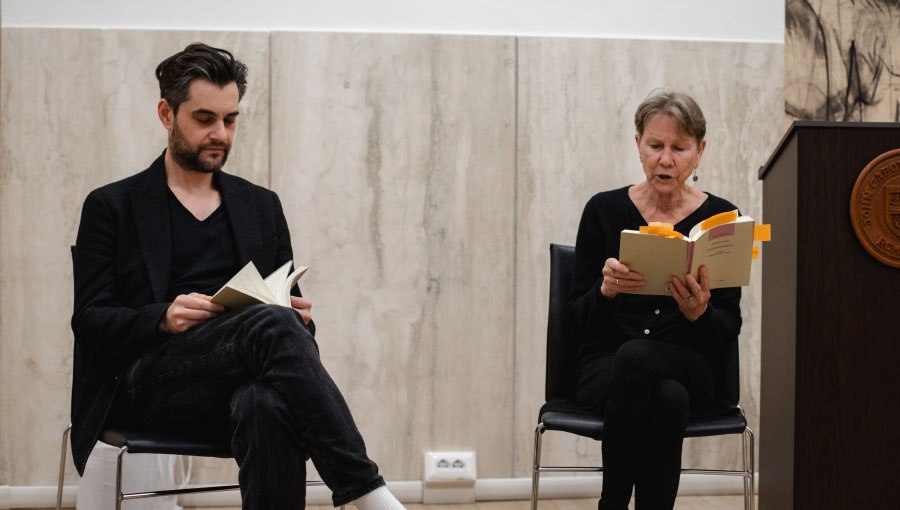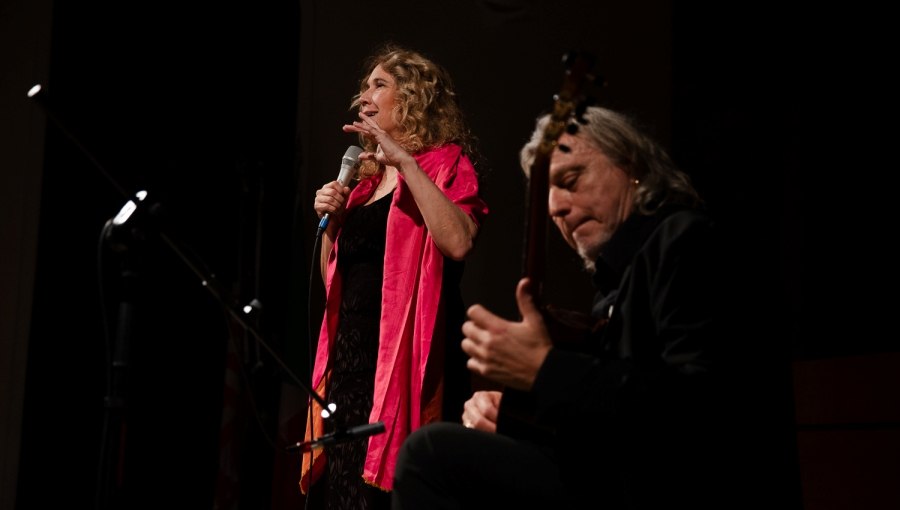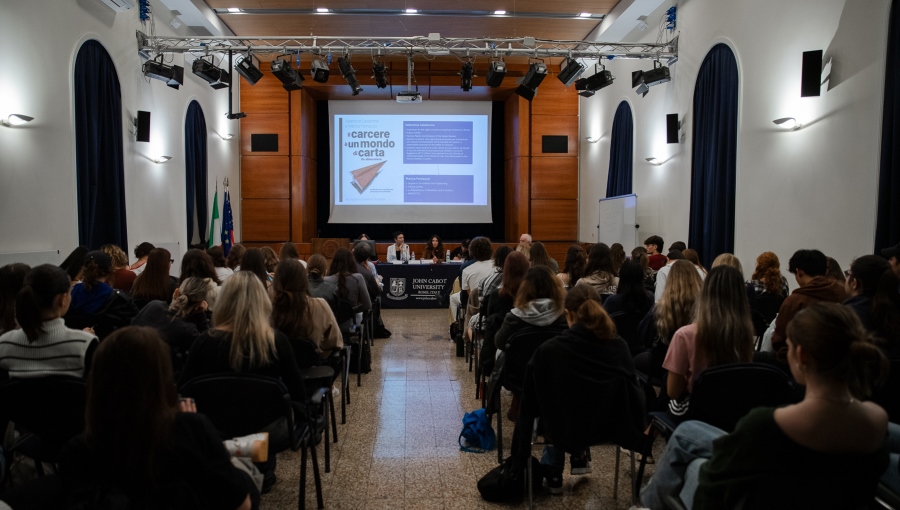Exploring Language, Culture, and Identity: Meet Alumna Diedré Blake
Born in Jamaica, Diedré Blake moved to the U.S. when she was fourteen. She graduated from JCU in 2014 with a B.A. in Italian Studies and a minor in Creative Writing. Diedré also holds a bachelor’s degree in art from Stanford University and a master’s in expressive therapy, specializing in art therapy from Lesley University in Massachusetts. In 2014, she was a recipient of the Premio America Award given by the Fondazione Italia USA and in that same year, she received JCU’s Award for Academic Excellence in Creative Writing. For the past few years, she has been working in Japan in the field of language education, guiding teachers to improve their skills through embracing cultural competency and developing self-awareness. Diedré recently participated in “Lift Every Voice: An Inclusive Black History Month Celebration” at JCU.
What made you decide to come to JCU to earn a second bachelor’s degree?
A combination of serendipity and a desire to learn about Italian culture in a setting that would best facilitate that experience were the driving factors behind my decision. During an extended visit to Rome, I happened upon the University while strolling the streets of Trastevere on a sunny morning—one of the best moments in my life.
John Cabot University provided me with an answer to my life question at that moment: where do I go and what can I do now? At that time, I was seeking a new sense of self and community. Luckily, I found it on that day.
You minored in German at Stanford and then majored in Italian Studies at JCU. What did you find most enriching about this major? What is it about the study of languages and cultures that attracts you?
In 2010, I visited Rome for the first time. At that time and still, I find that the city and its people exude an indescribable charm, a sort of magnetic pull. I wanted to understand that pull, which drove me to be more expressive and thus more creative. The Italian Studies major at JCU offers a unique perspective into Italian culture and an opportunity to explore its facets, language, politics, history, etc., while living in the country itself. The Italian Studies professors, however, were the most enriching aspect of my studies. They brought a human element to the learning experience, which ultimately increased my appreciation for the Italian language and culture.
From a very young age, I was exposed to various cultures. Both of my parents traveled broadly, each living in different countries for extended periods. It seemed natural to me to be curious about and explore cultures foreign to my own. Regarding language, I developed an interest in learning language due to my father, who speaks German and lived in Germany. Because of his influence, I learned that languages broaden our understanding of both our external and internal worlds.
What did you most enjoy about the courses you took for your Creative Writing minor?
I enjoyed the relationship I developed with my professors, who helped me to understand myself better as a writer. I most enjoyed the workshop courses, especially those in which I could explore literary translation. Studying creative writing at JCU became the road map for developing my relationship with the Italian language.
When I began my studies in 2011, my creative writing was done in English. However, by 2014, I was writing poetry and prose in Italian. Making sense of my world through the exploration of writing in another language has been one of the most rewarding experiences—even if the journey was not always easy.
Tell us about your undergraduate thesis.
My thesis was a heuristic inquiry into language and identity, specifically exploring language acquisition through literary translation. The title of the thesis is “Language as Identity: A Heuristic Inquiry of Literary Translation through Mario Tornello’s A braccia aperte.” It is a long but apt title. The thesis is composed of two parts: the heuristic inquiry and my translation of Tornello’s book into English.
The origin story of my thesis starts in an old bookstore in Garbatella, where I came across Tornello’s poetry book A braccia aperte. At that time, I could neither read nor understand much Italian. However, the poem “Parlerò di te” mesmerized me—just the written words and my imagining of their sounds. Although I had an appreciation of Italian culture, I felt detached from the language. The discovery of that book changed everything. In an instant, learning Italian was no longer a chore, but something I wanted to do. I wanted to understand not only the language from a technical viewpoint but also how the language would inform and/or change my sense of identity.
As a part of my research, I interviewed Italian professors and literary translators, learning about language acquisition and the interplay between cultural identity and creative writing in the translation process. This information informed my process as I translated Tornello’s work. Moreover, it provided me with a framework for understanding what it takes to be a good translator.
What do you think makes someone a good translator?
Effective literary translation, in my opinion, requires three important skills: 1) genre competency, 2) target language competency (linguistic skill, cultural understanding, etc.), and 3) source language competency. Regarding source language competency, it is possible to be less skilled in this area and to supplement one’s lack of knowledge by consulting with others.
Tell us about your work in Japan. What was it like to adapt to yet another culture?
I moved to Japan in 2017 to begin working as an English teacher. Since then, I have taught thousands of people, while being able to continue my exploration of language acquisition and identity through observing the process of my students as well as my own experience learning Japanese.
These days I am rarely in the classroom as my work has shifted to managing the development of English teachers rather than being one. An important aspect of my work now is helping teachers adapt to life in Japan, including developing cultural awareness and understanding as well as encouraging language acquisition.
Adapting to cultures foreign to my own has been a way of life for me. From an early age, I have lived outside of my birth country and have had to learn how to adjust. Japanese culture and language have presented a unique challenge to me because I grew up in western societies. Like with my journey to embrace the Italian language, I chose a creative path to understanding Japanese culture and learning the language. I use my love for poetry to inform my language studies (e.g., writing haiku and tanka poetry in Japanese). I also study Ikebana, Japanese floral arrangement, and taiko, Japanese drumming. Engaging in these activities has allowed me to build a community and a sense of identity within the culture. As Japanese is a complex and rich language in both its written and spoken forms, the journey to learn it has been equally so.
What are your plans for the future?
Ultimately, my plan is to complete a doctoral degree, exploring the topics of language, culture and identity. Given the current global pandemic, it is difficult to state where this will happen. In the interim, however, I plan to continue helping others learn how to make sense of living in a culture foreign to them, educate others in language learning/acquisition, and publish my writing.
What advice would you give to someone considering studying at an American university abroad like JCU?
Simply put, go for it! Taking the opportunity to study abroad is important for improving one’s understanding of the world. We often speak about the world becoming smaller. However, in my opinion, the world is becoming larger, i.e., our internal worlds become larger when we learn more about the external world.
JCU provided me with a comfortable academic setting in which to explore a foreign world. I was surrounded by knowledgeable people who understood me and who helped me bridge the areas of disconnect between myself and Italian culture and language. In essence, JCU became my family, a support system, while I was in Italy and still after.






